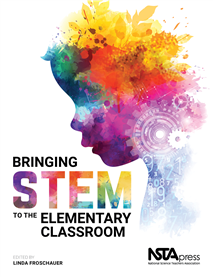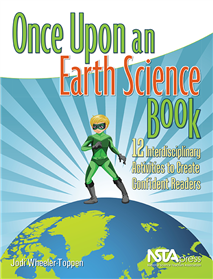All Resources
Book Chapter
A STEM activity is any activity that integrates the use of science, technology, engineering, and mathematics to solve a problem. This chapter presents a STEM unit that was completed over two weeks in a kindergarten classroom. The unit focused on the ...
Book Chapter
Inviting Engineering Into the Science Lab
This chapter presents examples of two lessons adapted from a second-grade program to incorporate the science and engineering practices into lab activities through the use of guided inquiry, rather than the structured-inquiry approach dictated in the ...
Book Chapter
In this activity, note the steps for redesign, and be open to following a design process, not a rigid the design process. Students may spend a long time exploring the properties of the materials before they begin making purposeful changes to refine t...
Book Chapter
Elephant Trunks and Dolphin Tails
This chapter focuses on how engineers help animals. After some time to brainstorm together, students come up with an idea that engineers may help veterinarians heal sick animals or zookeepers develop safe habitats. An engineering design challenge is ...
Book Chapter
This chapter shares two examples of “classic” science lessons adapted to teach science content through engineering design. It also provides some more general strategies for adapting science investigations to focus on engineering design. In the fi...
Book Chapter
In this activity, students transform STEM journals into E-books while integrating science, technology, and literacy. The chapter brings forward the idea of integrating iPads into the classroom. With the students’ previous experience with Engineerin...
Book Chapter
The lessons contained in this chapter highlight collaborating to improve teacher STEM preparation. This collaboration provided preservice teachers the unique opportunity to develop science units that could be implemented with young children at the lo...
Book Chapter
Am I Really Teaching Engineering to Elementary Students?
This chapter features lessons from an environmental engineering summer camp for first and second graders, with the goal of introducing students to engineering and to address the engineering design standards found in the Next Generation Science Standa...
Book Chapter
In this chapter, students investigate how to carry and transport a heavy object including designing and using a tool. With science, technology, engineering, and mathematical concepts involved, it could be included as part of a larger inquiry or proje...
Book Chapter
In this chapter, early childhood students design a piece of playground equipment using a 3-D printer. Kindergarten and first-grade students were charged with designing new playground equipment to create a solution to a problem of the school playgroun...
Book Chapter
In this chapter, second-grade students investigate material properties. Students were introduced to the Next Generation Science Standards model of the engineering design process (EDP) and given different materials to test to determine the best soluti...
Book Chapter
The true purpose of this activity is to introduce students to a five-step EDP (engineering design process). In this chapter, second graders design, build, test, and improve tools to map a waterway, and the design activities are described in detail as...
Book Chapter
Think It, Design It, Build It, Test It, Refine It
In this chapter, a unit on water quality ends with a water filtration engineering design activity and was a win-win situation. Students were already very curious to learn about water filtration after their study of water properties and water quality ...
Book Chapter
A design task helps students identify and find solutions to a school-yard problem. A module was conducted in four 90-minute sessions. Session 1, Preview module and introduce engineering with a warm-up design; Session 2, Unpack and explore the communi...
Book Chapter
This chapter shows how science and engineering practices can be integrated into the elementary classroom by providing snapshots of activities from a STEM curriculum unit. The unit, focused on aerospace engineering, challenges students to design parac...
Book Chapter
Designing a Sound-Reducing Wall
In this chapter, students explore engineering with a fun challenge. To help students better understand sound in a fun and engaging way, an engineering design–based science learning activity was conducted that is appropriate for a third- or fourth-g...
Book Chapter
Blade Structure and Wind Turbine Function
In this chapter, third and fifth graders co-investigate and co-design wind turbine blades and voltage output. The wind turbine lessons featured emerged from the desire to help students build on their learning about energy transformation. The goals of...
Book Chapter
You and Your Students as Green Engineers
In this chapter, using creativity and everyday materials to design and improve a solar oven highlights one teacher’s journey with her fifth-grade students as they embarked on an engineering adventure together. In this case, literacy, social studies...
Book Chapter
In this chapter, third-grade students solve a real-world problem using the engineering design process, collaborative group work, and integrated STEM education. By introducing students to the ideas of recycling and composting and by showing them the e...
Book Chapter
This chapter explores how one teacher employed 3-D printing technology with fourth-grade students in a STEAM (science, technology, engineering, arts, and mathematics) lab to design and create a prosthetic hand. This project-based unit provided a memo...
Book Chapter
In this chapter, a paper airplane investigation highlights scientific and engineering practices. The investigation relates to students’ personal experiences and interests and cultivates enthusiasm by allowing students to develop ideas about forces...
Book Chapter
This chapter features a STEM investigation project for intermediate students with real-life connections. The goals for this unit were to help the students understand systems and system models in real-world contexts and to be able to distinguish the p...
Book Chapter
In this chapter, toy testing creatively engages fifth-grade students in engineering design. This toy rocket unit engaged fifth-grade students in an engineering design process that allowed them to integrate engineering, physical science, and mathemati...
Book Chapter
A “Snapshot of Science” Program brings science and engineering into the library. The lesson described here is part of what we like to call a “Snapshots of Science” program. These mini-lessons of science are taught once a week to all students ...
Book Chapter
An integrative science unit combines science content on severe weather with the engineering design process (EDP). The purpose of this unit is to interweave science content on severe weather with the EDP. The unit includes concepts such as properties ...
Book Chapter
Straw Rockets Are Out of This World
This chapter features STEM activities for upper-elementary students. This lesson gives students the opportunity to experience the joys and challenges of developing straw rockets and then observing which design can travel the longest distance. The les...
Book Chapter
In this chapter, learning about plant structures helps students design water collection devices. This chapter describes the final lesson in a seven-day STEM and literacy unit that is part of the Picture STEM curriculum. The engineering design compone...
Book Chapter
When confronted with a robotics engineering task, fourth-grade students develop growth mindsets. In this chapter, the tightrope challenge will be discussed and a length of rope is suspended at student height and secured at each end of the room. While...
Book Chapter
Model-eliciting activities (MEAs) create opportunities to incorporate new standards and evaluate teacher performance. MEAs are simulated real-world problems that integrate engineering, mathematical, and scientific thinking as students find solutions ...
Book Chapter
This chapter contains information on teaching reading strategies that can help students improve their reading and help them to begin to view reading as an active search for meaning. The first step is to create a classroom culture in which students fe...
Book Chapter
How Do You Know That? Helping Students With Claims, Evidence, and Reasoning
At one time, teachers were not familiar with the concept of scientific argumentation—the process of making claims and supporting them with evidence. Since that time, both the Next Generation Science Standards (NGSS) and the Common Core State Standa...
Book Chapter
This chapter has two main goals. The first is to ease students into the reading procedures by featuring two reading passages. One allows students to practice using codes to record what they are thinking as they read and the other one lets students pr...
Book Chapter
This lesson is designed to introduce students to the key ideas and vocabulary associated with erosion. Students will see erosion at work in a simulation and try out some different ways to lessen the effect. Then they will read about the three main ag...
Book Chapter
Plate tectonics is the primary theory that drives explanation in geology, but the idea that land masses drift around the Earth can sound as crazy to students as it did to geologists in the early 1900s. Spending time on the history and evidence of pla...
Book Chapter
The Ocean on Top of a Mountain
In this chapter, students will simulate the “life” of a mountain and then think about what traces of each stage of the mountain’s life are present at the end of the simulation. Then they will read about the Burgess Shale and how scientists used...
Book Chapter
Many students have never looked carefully at rocks. For this reason, looking closely at several different types of rocks is important for preparing them to learn about how rocks are classified. In this chapter, one goal is to help students see how id...
Book Chapter
In this lesson, it is assumed that students have had some encounter with the water cycle previously, but may not understand the important role of groundwater in the cycle. Karst terrain provides a hook for studying groundwater, for thinking more deep...
Book Chapter
Many middle school students still struggle with the concept of density, without which it is difficult to understand overturning circulation. This chapter begins with physical models of temperature and saline density differences and moves to looking a...
Book Chapter
Hot air rises and cold air sinks so winds move between the equator and the polar regions. The work of the wind on the water is predictable. The Great Pacific Garbage Patch is a testament to both the movement of Earth’s winds and the effect of human...
Book Chapter
The Sun is the ultimate power source for many of the processes on Earth, and water serves as a battery, storing and releasing the Sun’s power. These ideas are important for students to understand, because they form the basis of weather. In this cha...




